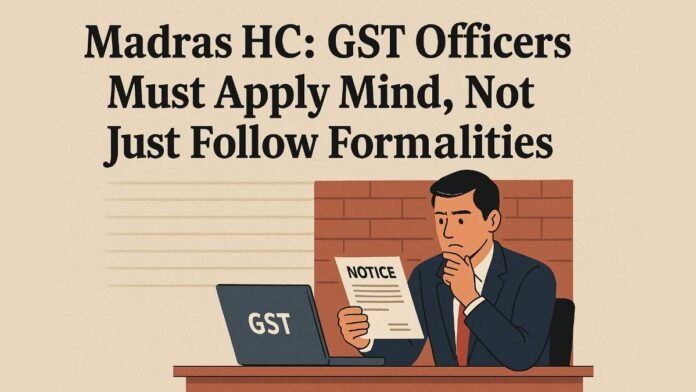The Madras High Court has emphasized that GST (Goods and Services Tax) officers must apply their minds when serving notices and not merely fulfill procedural formalities, especially when taxpayers fail to respond to electronic communications. The court observed that ineffective service leads to unnecessary litigation, burdening both taxpayers and judicial forums.
Madras HC: GST Officers Must Ensure Effective Notice Service, Not Just Formalities
Court’s Observation on GST Notice Service
A bench of the Madras High Court noted that while uploading notices on the GST portal is a valid mode of service, officers must ensure actual receipt by taxpayers. The court stated:
“No doubt, sending notice by uploading in the portal is a sufficient service, but the officer who is sending repeated reminders, despite no response from the petitioner, should have applied his/her mind and explored the possibility of sending notices by other modes prescribed in Section 169 of the GST Act. Otherwise, it will not be an effective service, rather, it would only fulfill empty formalities.”
Case Background: Tvl.Metro Computers’ Challenge
The petitioner, Tvl.Metro Computers, challenged an assessment order, arguing that all prior notices had been uploaded solely on the GST portal under the “View Additional Notices and Orders” section. The petitioner claimed they were unaware of these notices and, as a result, could not file a timely response. Expressing willingness to pay 25% of the disputed tax amount, they requested an opportunity to present their case afresh.
Government’s Stand and Court’s Decision
The Government Advocate acknowledged that notices had been uploaded on the portal but conceded that no opportunity for a personal hearing had been granted before passing the impugned order. She did not object to remanding the matter back, subject to partial payment of tax.
Justice Krishnan Ramasamy ruled that while portal-based service is legally valid, it is ineffective when taxpayers repeatedly fail to respond. In such cases, officers must explore alternative service methods under Section 169 of the GST Act, such as registered post or email, to ensure proper communication.
The court cautioned that merely fulfilling procedural formalities without ensuring actual service results in ineffective adjudication and unnecessary litigation. Officers must apply their minds and adopt alternate service methods when warranted to uphold the spirit of the GST Act.
Court’s Directive for Fresh Proceedings
The court set aside the impugned order and remanded the matter back to the assessing officer, directing fresh proceedings upon the petitioner’s payment of 25% of the disputed tax within four weeks. The petitioner must file its reply within three weeks of payment, after which a personal hearing must be granted and a fresh order passed on merits in accordance with the law.
Legal Representation
- Petitioner: Ms. C. Rekhakumari
- Government Advocate: Ms. Amirta Poonkodi Dinakaran
Key Takeaways for Taxpayers and GST Officers
This ruling reinforces the importance of effective service of notices in GST adjudication. Taxpayers must remain vigilant about notices uploaded on the GST portal, while officers must ensure proper communication through alternate modes when necessary. The judgment serves as a reminder that procedural compliance alone is insufficient—actual service and meaningful adjudication are essential to uphold justice and prevent unnecessary litigation.
For expert legal assistance in GST matters, Rajendra Law Office LLP remains committed to providing strategic guidance and representation. Stay informed, stay compliant!

